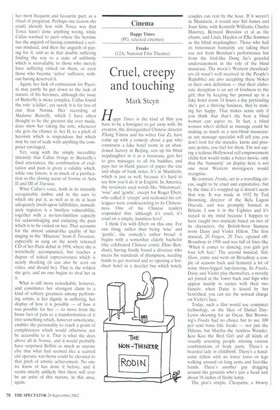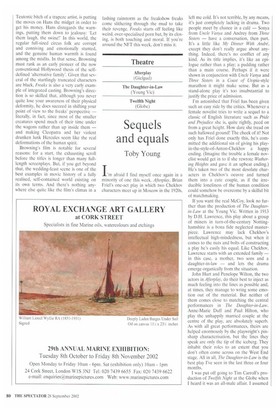Cruel, creepy and touching
Mark Steyn
Happy Times is the kind of film you have to be a foreigner to get away with. Its creators, the distinguished Chinese director Zhang Yimou and his writer Gui Zi, have come up with a comedy about a guy who constructs a fake hotel room in an abandoned factory in Beijing, sets up his blind stepdaughter in it as a masseuse, gets her to give massages to all his buddies, and pays her in blank pieces of paper the size and shape of bank notes. It's in Mandarin, which is just as well, because it's hard to see how you'd do it in English. In America, the reviewers used words like 'bittersweet', `wise' and 'gentle', except for Roger Ebert, who called it 'creepy' and reckoned his colleagues were condescending to its Chineseness. One of his Chinese readers responded that 'although it's cruel, it's cruel on a simple, harmless level'.
I think I'm with Ebert on this one. For one thing, rather than being Vise' and 'gentle', the comedy's rather broad: it begins with a somewhat elderly bachelor (the celebrated Chinese comic Zhao Benshan), having finally found a divorcee who meets his standards of plumpness, needing funds to get married and so opening a hotsheet hotel in a derelict bus which lonely couples can rent by the hour. If it weren't in Mandarin, it would star Sid James and Joan Sims, with Kenneth Williams, Charles Hawtrey, Bernard Bresslaw et al as the chums, and Linda Hayden or Elke Sommer as the blind stepdaughter. Those who hail its bittersweet humanity are taking their cue not from Benshan's performance but from the bird-like Dong Jie's graceful understatement in the role of the blind masseuse. The movie's Western cheerleaders (it wasn't well received in the People's Republic) are also accepting these blokes at their own definition — that their elaborate deception is an act of kindness to the girl: that by keeping her penned up in a fake hotel room 24 hours a day pretending she's got a thriving business, they're making her happy. That makes sense only if you think that that's the best a blind woman can aspire to. In fact, a blind woman who's skilled at massage could be making as much as a non-blind masseuse: as any massage specialist will tell you, you don't look for the muscles, knots and pressure points, you feel for them. I'm not saying a tedious Hollywood self-empowerment cliché-fest would make a better movie, only that the 'humanity' on display here is not one most Western moviegoers would recognise.
By contrast, Freaks, set in a travelling circus, ought to be cruel and exploitative, but by the time it's wrapped up it doesn't seem that way. It was made in 1932 by Tod Browning, director of the Bela Lugosi Dracula, and was promptly banned in Britain. I saw it in the Eighties and it's stayed in my mind because I happen to have caught two musicals based on two of its characters, the British-born Siamese twins Daisy and Violet Hilton. The first musical, 20 Fingers, 20 Toes, opened offBroadway in 1990 and was full of lines like 'When it comes to dancing, you girls got four left feet.' The second musical, Side Show, came and went on Broadway a couple of seasons back and featured a lot of noisy three-legged tap-dancing. In Freaks, Daisy and Violet play themselves, a novelty act joined at the lower back and hips who appear mainly in scenes with their two fiancés: when Daisy is kissed by her betrothed, you can see the sensual charge on Violet's face.
Today, such a film would use computer technology, or the likes of Daniel DayLewis shooting for an Oscar. But Browning's Freaks had no choice but to use 100 per cent bona fide freaks — not just the Hiltons, but Martha the Armless Wonder, Koo Koo the Bird Girl and all kinds of visually arresting people missing various combinations of body parts. There's a bearded lady in childbirth. There's a handsome fellow with no lower torso or legs walking around on long arms and feet-like hands. There's another guy dragging around the grounds who's just a head and about 18 inches of fleshy lump.
The plot's simple. Cleopatra, a blowsy Teutonic bitch of a trapeze artist, is putting the moves on Hans the midget in order to get his money. Hans disregards the warnings, putting them down to jealousy: 'Let them laugh, the swine!' In this world, the regular full-sized circus folk are corrupt and conniving and emotionally stunted, and the genuine human warmth is found among the misfits. In that sense, Browning must rank as an early pioneer of the now conventional Hollywood thesis of the selfdefined 'alternative family'. Given that several of the startlingly truncated characters are black, Freaks is also a very early example of integrated casting. Browning's direction is so skilled that, although you never quite lose your awareness of their physical deformity, he does succeed in shifting your point of view to the freaks' perspective — literally, in fact, since most of the smaller creatures spend much of their time under the wagons rather than up inside them — and making Cleopatra and her violent drunken Junk Hercules seem like the real deformations of the human spirit.
Browning's film is notable for several reasons: for a start, the exhausting scroll before the titles is longer than many fulllength screenplays. But, if you get beyond that, the wedding-feast scene is one of the best examples in movie history of a fully realised, self-contained world existing on its own terms. And there's nothing anywhere else quite like the film's climax in a lashing rainstorm as the freakshow freaks come slithering through the mud to take their revenge. Freaks starts off feeling like weird, over-specialised porn but, by its closing, is both touching and moral. If you're around the NFT this week, don't miss it.



































































































 Previous page
Previous page